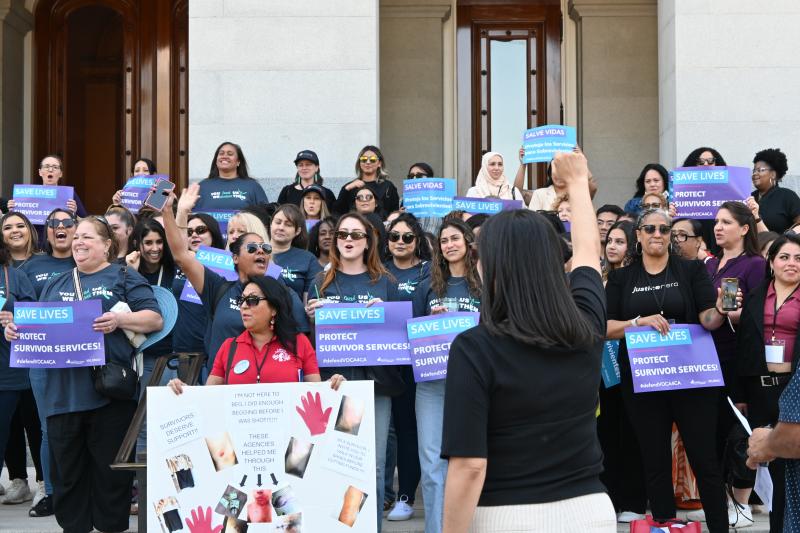Cutting Costs Will Cost Lives: In Defense of Funding Essential Victim Services, by Angela Kim
June 3, 2025

As a survivor of sexual and intimate partner violence, I know that crisis services aren’t a luxury; they’re essential for helping people heal and move forward with safety, dignity, and hope. So why did Governor Newsom leave out the victim services funding needed to fill federal gaps in his May Budget Revision?
I know first-hand that experiencing violence can be deeply frightening, and navigating the complex aftermath of trauma is often overwhelming. If Governor Newsom and the Legislature do the right thing and provide this funding in the final budget, it will allow the newly established California Crime Victims Fund to grow without leaving survivors stranded. It will sustain 24-hour crisis hotlines, emergency shelters, counseling, legal advocacy, and more essential resources.
Access to these services saved my life. I knew very little about the healing process after enduring three years of intimate partner abuse. When I left my abuser, I thought I was fine. He was ten hours away and could no longer lay his hands on me. He flooded my phone with thousands of texts every day, but when they gradually slowed, I convinced myself I was okay. I didn’t seek counseling, choosing instead to suppress memories of the physical, emotional, and sexual violence he put me through. What I didn’t recognize was that trauma was manifesting in unexpected ways. I developed hypersexuality, a common trauma response among survivors of sexual violence, using risky and harmful sexual behavior as a misguided attempt to reclaim control over my body. I freely gave away my consent, thinking I was in charge. I didn’t know then that agency and control are different for a reason.
One night, a soon-to-be intimate partner drugged me. Though I managed to escape, I was terrified. The police became involved, and in that moment, I realized that the trauma I had endured could no longer be ignored. I was ready to seek support from therapists, advocates, and counselors to begin healing from intimate partner violence and now an attempted drug-facilitated assault.
In my work within violence prevention, I see the experiences, knowledge, and survivors behind the statistics. The California Violence Experiences Survey report reveals a striking reality that nearly half of women in California have experienced intimate partner violence in their lifetime. In the past year, one in 30 adults in the state faced physical and/or sexual violence from a partner. Trauma doesn’t simply fade away on its own. Without essential services, survivors face devastating health outcomes, including suicidality, substance use disorders, and severe depression. The federal funding that supports thousands of Californians is at risk, so our state leaders must step up to make their safety a top priority.
For me, reaching out to supportive services was an uphill battle. I battled self-blame, low self-esteem, and worries over the cost of these services. But I found support through Victims of Crime Act-funded services: therapy to process the abuse, group counseling with other survivors, and legal guidance from a domestic violence advocate. These services gave me the strength and resilience to rebuild my life, and I worry deeply for other survivors who may not have the same access to support. The availability of survivor-supportive services creates a vital public safety net. Simply knowing these services exist can provide survivors with the courage to leave abusive situations and seek help. Seeking support after experiencing abuse is already an overwhelming decision, yet without California’s commitment to address gaps in the federal Victims of Crime Act, survivors in our state could be left to wait months or travel long distances to access lifesaving help.
If I hadn’t had access to my support network, I likely would have remained trapped in risky and harmful behaviors, perpetuating cycles of trauma rather than finding a path to healing. I urge Governor Newsom, President pro Tempore McGuire, Speaker Rivas, and other state leaders to remember that protecting and funding these services is not optional. Survivors’ lives are on the line.
 Bio: Angela Kim is a disabled Korean American writer and survivor of intimate partner violence and sexual violence. Angela has been involved in violence prevention work at the systems level throughout California and is currently a doctoral student in public health.
Bio: Angela Kim is a disabled Korean American writer and survivor of intimate partner violence and sexual violence. Angela has been involved in violence prevention work at the systems level throughout California and is currently a doctoral student in public health.




